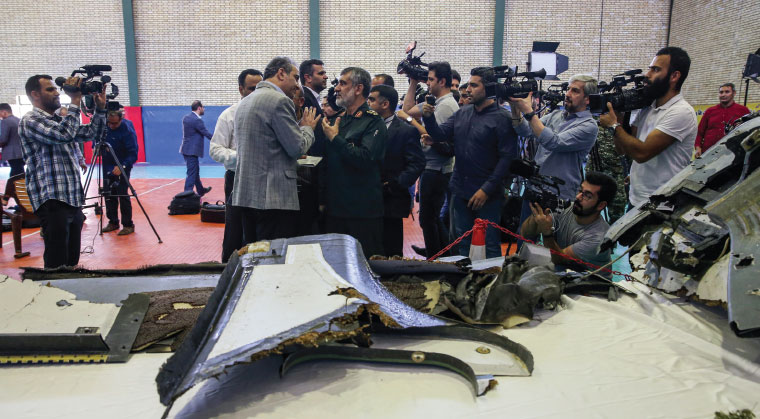President Prudent

What is Trump’s plan as Iran plays hardball?

Photo: AFP/IMAGEBANK
T
he fighter jets had already taken off, and the battleships were maneuvering into position. The final countdown toward an American military strike on Iran had begun when President Trump gave the order to call off the operation. No one knows exactly what went through his mind in those moments. In an interview days later, Trump said he decided to change course when he was told that 150 people would die as a result of the strike, which was planned after Iran downed an American drone.
But perhaps there was another thought that crossed the president’s mind. In two words: America First. On the campaign trail, Trump promised voters again and again that he would not get involved in military conflicts abroad that cost taxpayers trillions of dollars without achieving tangible results.
Or perhaps Trump was thinking of these three words: death and sand. That’s what the president called the Middle East in his last State of the Union address, implying that as far as he’s concerned, the region is somebody else’s problem.
The truth is that the cancellation of the strike adheres better to Trump’s ideology than entering into an unplanned military confrontation. An open conflict with the Iranians would serve the interests of the ayatollahs in Tehran much more than America. On Sunday, reports had already surfaced that the United States had carried out a cyberattack on Iranian military infrastructure — a far simpler and safer option than a missile strike.
Now the initiative has passed to the Iranians. What to America is a cold calculation — it’s not worth going to war over a downed drone — is liable to be perceived by the Iranians as a demonstration of weakness. Such a situation could lead to new provocations against American allies, both in the Persian Gulf and across the world, which would leave Trump no alternative but war.
Michael Doran, a senior fellow at the Hudson Institute in Washington, D.C., told Mishpacha that Trump acted prudently in not immediately striking back. “Ben-Gurion said [quoting Pirkei Avos], ‘The notebook is open, and the hand is writing.’ Trump can respond at a time and place of his choosing. I actually think he was wise hitting them with a cyberattack rather than a military attack at this time. And that’s because he’s got the G20 at the end of the week and the Iranians are trying to create a fear of war. I think it was wise at this particular moment to defuse the tension.”
What about those who say the United States cannot let a strike go unanswered? Doran says the conflict with Iran is multifaceted. “There isn’t a simple military solution to this problem, just like there’s no simple military solution to Gaza. It’s a problem that has to be managed. Not rushing to hit them at this moment is probably the wiser move. I stress — this moment.” Doran added that Trump’s hesitancy may also have a political benefit. Democratic leaders are accusing the White House of rushing to war in the Middle East, but now, Doran says, Trump has proven them otherwise.
Another senior fellow at the Hudson Institute, Mike Pregent, told Mishpacha that there’s a diplomatic rationale behind Trump’s behavior. “Trump can now say he saved 150 IRGC [Iranian Revolutionary Guard Corps] personnel from being killed, that he showed constraint, that he’s willing to talk to the [Iranian] supreme leader, and after an appeal to the UN Security Council to condemn Iran’s actions, Trump can say we’ve exhausted all diplomatic means and the next time Iran attacks, the US will respond forcefully.”
The cyberattack, Pregent said, was an effective, and non-kinetic, strike. “The president looks like the adult in the room,” he said, “about to punish bad behavior after exhausting all options.”
(Originally featured in Mishpacha, Issue 766)
Oops! We could not locate your form.













